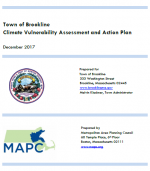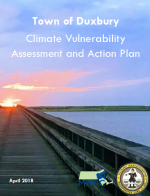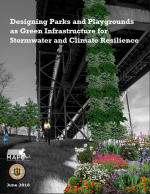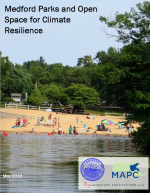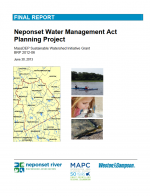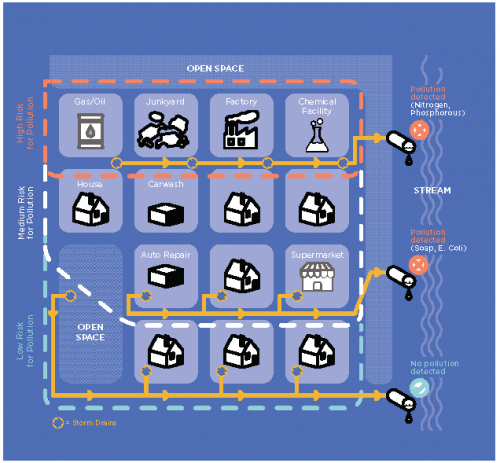Environment
MAPC
Smart Growth & Regional Collaboration
MAPC’s Environment Department provides technical assistance and policy guidance to municipalities on issues ranging from climate preparedness and vulnerability assessments to natural hazard mitigation to sustainable water management.
In addition to assisting MAPC’s cities and towns with plans and analysis, the Environment team lends their expertise to a range of other projects: facilitating regional climate planning, working on joint projects with other departments and agencies, and creating tools and guides on everything from stormwater management to climate-smart parks.
The team also works on local, state, and national-level policy implementation and analysis. As part of the Massachusetts Environmental Policy Act, MAPC staff submits comment letters on potential adverse environmental impacts of projects considered to be of significant regional impact. (Read the comment letters here).
This page focuses on MAPC's environment work. For clean energy and mitigation work, visit MAPC's Clean Energy page.
Learn more about specific services the Environment team provides below. Please contact Environmental Planning Director Martin Pillsbury at [email protected] with any questions.
Highlighted Toolkits and Resources
- Climate Resilient Land Use Strategies: In this resource, we highlight regulatory language and policy examples to advance municipal climate resilience. Use the toolkit to find example regulatory language, background on resilient land use, and additional resources.
- Low Impact Development Toolkit: Learn about strategies to manage stormwater in low-impact ways, such as maintaining natural drainage paths, minimizing land clearance, clustering builders, and reducing impervious surfaces.
- Metro Mayors Climate-Smart Region: Use this decision support tool created in partnership with The Trust for Public Land to understand key climate risks and vulnerabilities and opportunities to prioritize green infrastructure and nature-based solutions for climate resilience
Climate Planning
Keeping people and places safe is one of any community's most basic jobs. An important part of that work is curbing the impact of our changing climate. MAPC takes a comprehensive, interdisciplinary approach to climate planning, helping identify practical steps to reduce your community's carbon footprint and build resilience to changing conditions. From coastal and inland resiliency to clean energy group purchasing and net zero planning, to public health and emergency response, we provide the highest level of technical assistance. Our work is all grounded in extensive data and real community engagement.
Contact MAPC’s integrated planning team today and discuss which of our many services will best help you realize a greener, more efficient, more resilient future.
Regional Climate Work
Regional Climate Strategy
MAPC’s Regional Climate Adaptation Strategy recommends local, regional, and state action to reduce vulnerability to the impacts of climate change by reducing greenhouse gas emissions. The strategy informs MAPC’s work by providing a set series of objectives and provides a single resource for decision makers across the region.
Metro Mayors Climate Preparedness Taskforce
The Metro Mayors Climate Preparedness Taskforce is a group of 15 communities and seven agencies in Greater Boston who coordinate and integrate climate mitigation and adaptation work, protect critical infrastructure and resources, and ensure that vulnerable populations have protection and adaptive capacity in the face of climate change.
MAGIC Climate Change Resilience Plan
In 2017, MAPC prepared a joint climate change resilience plan for the MAGIC Subregion, a group of 13 cities and towns northwest of Boston.
Climate Vulnerability Assessments and Action Plans
Our plans analyze future climate projections, including extreme heat, drought, inland flooding, and sea-level rise. We consider potential impacts to public and private infrastructure, vulnerable populations, natural resources, public health, and the local economy. With our award-winning community engagement, we ensure diverse and representative involvement, from business owners, residents, community leaders, municipal officials, community organizations and underrepresented groups, in creating the most effective climate actions and resilience recommendations.
Examples:
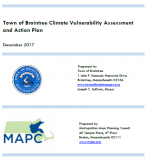
Braintree Climate Vulnerability Assessment (2017)
Municipal Vulnerability Preparedness
MAPC is an experienced Municipal Vulnerability Preparedness (MVP) program provider with a diverse range of expertise in environmental planning, public health, clean energy, land use, and community engagement. Climate change crosses political political boundaries, and so does MAPC's approach to vulnerability preparedness across sectors, municipal departments, and disciplines. The breadth and depth of our experience and data resources gives MAPC unparalleled insight while guiding communities through the MVP process.
Examples:
Climate Smart Parks
Integrating parks, playgrounds, and open space into the fabric of cities and towns improve the livability, community cohesion, and health and well-being of its residents. They also serve to enhance resilience by reducing urban heat island effects, capturing inland flooding and stormwater, and managing sea level rise and storm surge.
However, the natural assets in municipal parks systems are also more vulnerable to extreme climate conditions such as urban heat, flash flooding, extreme winds, and challenges with air and water quality. Understanding park systems opportunities and risk in our changing climate is critical toward our future livability and resilience. MAPC integrates parks and open space planning in the context of our changing climate by assessing vulnerability, prioritizing new park spaces to enhance resilience, and producing design recommendations with retrofits or redevelopment that align with climate vulnerabilities and park amenity needs.
Natural Hazard Mitigation
Hazard mitigation plans identify actions that can reduce dangers to life and property from natural hazard events, including hurricanes, tornadoes, winter storms, and earthquakes. Once hazards are identified, MAPC helps create long-terms strategies to help limit harm.
Through the Federal Disaster Mitigation Act of 2000, municipalizes need to adopt local multi-hazard mitigation plans and update them every five years to receive FEMA hazard mitigation grant funding. MAPC provides assistance to cities and towns to develop and update their local Hazard Mitigation Plans.
Sustainable Water Management
Stormwater runoff is the Commonwealth’s leading cause of water quality and quantity problems. Increasingly common problems like beach and shellfish bed closures, fish kills, water contamination, habitat loss, and depleted or polluted groundwater are the result of non-treated or poorly controlled stormwater runoff. Stormwater management is a growing challenge for local governments, and municipalities must develop approaches that protect and enhance their water resources while managing systems to handle precipitation.
Integrated Water Management
Integrated Water Management (IWM), or total water management, is a comprehensive planning method of managing water resources in a way that balances social and economic needs and ensures ecosystem protection. IWM integrates planning across three water sectors: wastewater, drinking water, and stormwater. MAPC can help create total water management plans, evaluate existing water conservation practices, develop scenarios regarding the volume of water needed and available in the future, and identify how a community or region can increase groundwater recharge or reduce environmental impacts.
Resources
-
- Summersmart Water Use Guide to Peak Season Water Demand Management (2006): This report is a catalog of strategies that communities can use to manage peak season water demand, including tools such as water pricing, local regulations, and public education
- Once is Not Enough: A Guide to Water Reuse in Massachusetts (2005):Provides an overview of technical, economic, and regulatory aspects of reusing treated wastewater for using such as toilet flushing, landscape irrigation, and industrial process water.
Stormwater
Over 70 percent of Greater Boston's rivers, lakes, ponds, and coastal waters are polluted. The leading source of that pollution is stormwater - rain or melted snow that runs off hard surfaces like roads, driveways, and parking lots. Under the EPA's MS4 regulations, cities and towns must map their full drainage system, sample for water quality, educate the public about stormwater, revise development bylaws and regulations, and retrofit their systems to treat pollution.
Because the regulatory, legal, and financial elements of stormwater management are so exacting and because the educational elements can be time consuming, many municipalities refer to bring in outside assistance. MAPC can help your community by:
-
- Drafting low impact development (LID) bylaws, stormwater bylaws and regulations, LID-friendly subdivision regulations, site plan reviews, and zoning regulations
- Establishing a Stormwater Management Utility or other funding mechanism that provides a long-term dedicated revenue source for stormwater management
- Educating local boards and regulators, building trust and communication
- Educating residents about the importance of runoff control and what they can do
Resources
-
- Low Impact Development Toolkit: Learn about strategies to manage stormwater in low-impact ways, such as maintaining natural drainage paths, minimizing land clearance, clustering builders, and reducing impervious surfaces.
- Stormwater Financing: Massachusetts municipalities are authorized to establish a stormwater management authority to charge drainage fees to property owners based on the amount of a property’s impervious surfaces. MAPC's Stormwater Financing Starter Kit lays out the steps needed to create and administer a stormwater management authority.
- Stormwater Bylaws Toolkit: This toolkit displays model bylaws and regulations that MAPC has created in partnership with six communities in the region.
- MAPC’s Outfall Catchment Calculator: MAPC has developed a simple method to rate stormwater catchment areas as High, Medium, or Low risk for contributing pollutants to water.


